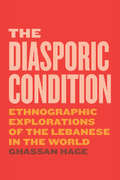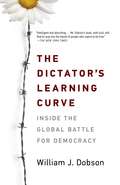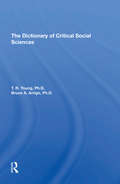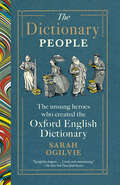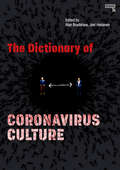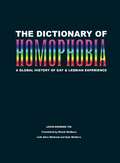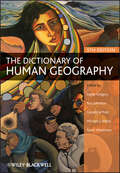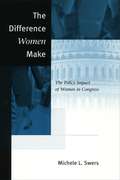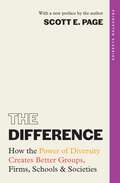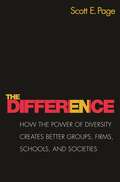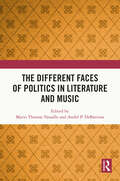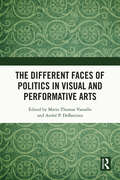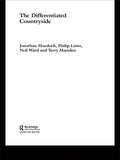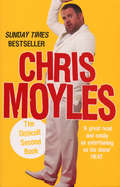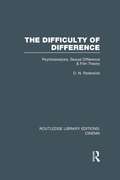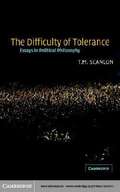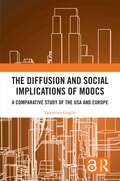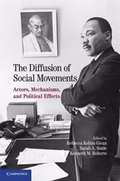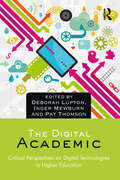- Table View
- List View
The Diasporic Condition: Ethnographic Explorations of the Lebanese in the World
by Ghassan HageBridging the gap between migration studies and the anthropological tradition, Ghassan Hage illustrates that transnationality and its attendant cultural consequences are not necessarily at odds with classic theory. In The Diasporic Condition, Ghassan Hage engages with the diasporic Lebanese community as a shared lifeworld, defining a common cultural milieu that transcends spatial and temporal distance—a collective mode of being here termed the “diasporic condition.” Encompassing a complicated transnational terrain, Hage’s long-term ethnography takes us from Mehj and Jalleh in Lebanon to Europe, Australia, South America, and North America, analyzing how Lebanese migrants and their families have established themselves in their new homes while remaining socially, economically, and politically related to Lebanon and to each other. At the heart of The Diasporic Condition lies a critical anthropological question: How does the study of a particular sociocultural phenomenon expand our knowledge of modes of existing in the world? As Hage establishes what he terms the “lenticular condition,” he breaks down the boundaries between “us” and “them,” “here” and “there,” showing that this convergent mode of existence increasingly defines everyone’s everyday life.
The Diasporic Condition: Ethnographic Explorations of the Lebanese in the World
by Ghassan HageBridging the gap between migration studies and the anthropological tradition, Ghassan Hage illustrates that transnationality and its attendant cultural consequences are not necessarily at odds with classic theory. In The Diasporic Condition, Ghassan Hage engages with the diasporic Lebanese community as a shared lifeworld, defining a common cultural milieu that transcends spatial and temporal distance—a collective mode of being here termed the “diasporic condition.” Encompassing a complicated transnational terrain, Hage’s long-term ethnography takes us from Mehj and Jalleh in Lebanon to Europe, Australia, South America, and North America, analyzing how Lebanese migrants and their families have established themselves in their new homes while remaining socially, economically, and politically related to Lebanon and to each other. At the heart of The Diasporic Condition lies a critical anthropological question: How does the study of a particular sociocultural phenomenon expand our knowledge of modes of existing in the world? As Hage establishes what he terms the “lenticular condition,” he breaks down the boundaries between “us” and “them,” “here” and “there,” showing that this convergent mode of existence increasingly defines everyone’s everyday life.
The Diasporic Condition: Ethnographic Explorations of the Lebanese in the World
by Ghassan HageBridging the gap between migration studies and the anthropological tradition, Ghassan Hage illustrates that transnationality and its attendant cultural consequences are not necessarily at odds with classic theory. In The Diasporic Condition, Ghassan Hage engages with the diasporic Lebanese community as a shared lifeworld, defining a common cultural milieu that transcends spatial and temporal distance—a collective mode of being here termed the “diasporic condition.” Encompassing a complicated transnational terrain, Hage’s long-term ethnography takes us from Mehj and Jalleh in Lebanon to Europe, Australia, South America, and North America, analyzing how Lebanese migrants and their families have established themselves in their new homes while remaining socially, economically, and politically related to Lebanon and to each other. At the heart of The Diasporic Condition lies a critical anthropological question: How does the study of a particular sociocultural phenomenon expand our knowledge of modes of existing in the world? As Hage establishes what he terms the “lenticular condition,” he breaks down the boundaries between “us” and “them,” “here” and “there,” showing that this convergent mode of existence increasingly defines everyone’s everyday life.
The Dick Van Dyke Show (TV Milestones Series)
by Joanne MorrealeThe Dick Van Dyke Show (CBS 1961-66) was a uniquely self-reflexive sitcom that drew on vaudevillian tropes at a time when vaudeville-based comedy variety was disappearing from television. At the same time, it reflected the liberal politics of the Kennedy era and gave equal time to home and work as it ushered in a new image of the sitcom family. In The Dick Van Dyke Show, author Joanne Morreale analyzes the series' innovative form and content that altered the terrain of the television sitcom. Morreale begins by finding the roots of The Dick Van Dyke Show in the vaudeville-based comedy variety show and the "showbiz" sitcom, even as it brought notable updates to the form. She also considers how the series reflects the social context of Kennedy's New Frontier and its impact on the television industry, as The Dick Van Dyke Show responded to criticisms of television as mass entertainment. She goes on to examine the series as an early example of quality television that also pointed to the complex narrative of today, examining the show's progressive representations of race, ethnicity, and gender that influenced the content of later sitcoms. Morreale concludes by considering The Dick Van Dyke Show's afterlife, suggesting that the various reappearances of the characters and the show itself demonstrates television's "transseriality." Fans of The Dick Van Dyke Show and readers interested in American television and cultural history will appreciate this insightful reading of the series.
The Dictator's Learning Curve: Inside the Global Battle for Democracy
by William J. DobsonIn this riveting portrait of authoritarianism in peril, acclaimed journalist William Dobson takes us inside the relentless battle between dictators and the people challenging their rule.We are witnessing an incredible moment in the war between dictators and democracy--waves of protests are sweeping Syria and Yemen, and despots have fallen in Egypt, Tunisia, and Libya. But the Arab Spring is only the latest front in a worldwide battle between freedom and repression, a battle that also rages in a dozen other countries from Venezuela to China, Russia to Malaysia. It is a struggle that, until recently, dictators have been winning hands-down. The reason is that today's authoritarian regimes are nothing like the frozen-in-time government of North Korea. They are ever-morphing, technologically savvy, and internationally connected, and they have replaced more brutal forms of intimidation with seemingly "free" elections and talk of human rights. Facing off against modern dictators is an unlikely army of democracy advocates--students, bloggers, environmentalists, lawyers, activists, and millionaires--who are growing increasingly savvy themselves. The result is a global game of cat-and-mouse, where the future of freedom hangs in the balance. Dobson takes us behind the scenes in both camps, and reveals how each side is honing its strategies for the war that will define our age.
The Dictionary Of Critical Social Sciences
by Bruce Arrigo T. R. YoungThis book is a teaching dictionary with the goal of de-mystifying current social science theory in a comprehensive, accessible format. It focuses on important terminology in progressive, radical, critical Marxist, feminist, left-liberal, postmodern, and semiotic contexts.
The Dictionary People: The Unsung Heroes Who Created the Oxford English Dictionary
by Sarah OgilvieA WASHINGTON POST BEST BOOK OF THE YEAR • WOMEN'S PRIZE FOR NON-FICTION FINALIST • The New York Times Book Review Editors' Choice • A history and celebration of the many far-flung volunteers who helped define the English language, word by word.&“Enthralling and exuberant, Sarah Ogilvie tells the surprising story of the making of the OED. Philologists, fantasists, crackpots, criminals, career spinsters, suffragists, and Australians: here is a wonder book for word lovers.&” —Jeanette Winterson, author of Oranges Are Not the Only FruitThe Oxford English Dictionary is one of mankind&’s greatest achievements, and yet, curiously, its creators are almost never considered. Who were the people behind this unprecedented book? As Sarah Ogilvie reveals, they include three murderers, a collector of pornography, the daughter of Karl Marx, a president of Yale, a radical suffragette, a vicar who was later found dead in the cupboard of his chapel, an inventor of the first American subway, a female anti-slavery activist in Philadelphia . . . and thousands of others. Of deep transgenerational and broad appeal, a thrilling literary detective story that, for the first time, unravels the mystery of the endlessly fascinating contributors the world over who, for over seventy years, helped to codify the way we read and write and speak. It was the greatest crowdsourcing endeavor in human history, the Wikipedia of its time. The Dictionary People is a celebration of words, language, and people, whose eccentricities and obsessions, triumphs, and failures enriched the English language.
The Dictionary Wars: The American Fight over the English Language
by Peter MartinA compelling history of the national conflicts that resulted from efforts to produce the first definitive American dictionary of English <P><P>In The Dictionary Wars, Peter Martin recounts the patriotic fervor in the early American republic to produce a definitive national dictionary that would rival Samuel Johnson’s 1755 Dictionary of the English Language. <P><P>But what began as a cultural war of independence from Britain devolved into a battle among lexicographers, authors, scholars, and publishers, all vying for dictionary supremacy and shattering forever the dream of a unified American language. <P><P>The overwhelming questions in the dictionary wars involved which and whose English was truly American and whether a dictionary of English should attempt to be American at all, independent from Britain. Martin tells the human story of the intense rivalry between America’s first lexicographers, Noah Webster and Joseph Emerson Worcester, who fought over who could best represent the soul and identity of American culture. <P><P>Webster believed an American dictionary, like the American language, ought to be informed by the nation’s republican principles, but Worcester thought that such language reforms were reckless and went too far. Their conflict continued beyond Webster’s death, when the ambitious Merriam brothers acquired publishing rights to Webster’s American Dictionary and launched their own language wars. <P><P>From the beginning of the nineteenth century to the end of the Civil War, the dictionary wars also engaged America’s colleges, libraries, newspapers, religious groups, and state legislatures at a pivotal historical moment that coincided with rising literacy and the print revolution. <P><P>Delving into the personal stories and national debates that arose from the conflicts surrounding America’s first dictionaries, The Dictionary Wars examines the linguistic struggles that underpinned the founding and growth of a nation.
The Dictionary of Coronavirus Culture
by Alan Bradshaw and Joel HietanenThe Dictionary of Coronavirus Culture presents an A-Z of life in lockdown. Taking everyday terms that capture the lived experience of lockdown — like chocolate, streaming, ageing, health, clapping, social distancing, dystopia, and frontline workers — and discussing them with a range of writers, theorists, and academics, it provides unusually accessible and friendly analysis of our shared historic moment. With contributions from Lynne Segal, Jo Grady, Kate Soper, Stefano Harney, and many more, The Dictionary of Coronavirus Culture is designed to help us come to terms with what COVID-19 and the associated lockdowns mean for us, and the world around us.
The Dictionary of Homophobia: A Global History of Gay & Lesbian Experience
by Louis-Georges Tin Marek RedburnBased on the work of seventy researchers in fifteen countries, The Dictionary of Homophobia is a mammoth, encyclopedic book that documents the history of homosexuality, and various cultural responses to it, in all regions of the world: a masterful, engaged, and wholly relevant study that traces the political and social emancipation of a culture.<P> The book is the first English translation of Dictionnaire de L’Homophobie, published in France in 2003 to worldwide acclaim; its editor, Louis-Georges Tin, launched the first International Day Against Homophobia in 2005, now celebrated in more than fifty countries around the world. The Dictionary of Homophobia includes over 175 essays on various aspects of gay rights and homophobia as experienced in all regions in Africa, the Americas, Asia, Europe, and the South Pacific, from the earliest epochs to present day.<P> Subjects include religious and ideological forces such as the Bible, Communism, Judaism, Hinduism, and Islam; historical subjects, events, and personalities such as AIDS, Stonewall, J. Edgar Hoover, Matthew Shepard, Oscar Wilde, Pat Buchanan, Joseph McCarthy, Pope John Paul II, and Anita Bryant; and other topics such as coming out, adoption, deportation, ex-gays, lesbiphobia, and bi-phobia. In a world where gay marriage remains a hot-button political issue, and where adults and even teens are still being executed by authorities for the “crime” of homosexuality, The Dictionary of Homophobia is a both a revealing and necessary history lesson for us all.
The Dictionary of Human Geography
by Geraldine Pratt Ron Johnston Sarah Whatmore Derek Gregory Michael WattsWith clear, critical, and constructive surveys of key terms by leading researchers in the field, The Dictionary of Human Geography, fifth edition, remains the definitive guide to the concepts and debates in human geography. Comprehensively revised new edition of a highly successful text with over 300 key terms appearing for the first timeSituates Human Geography within the humanities, social sciences and sciences as a wholeWritten by leading experts in the fieldMajor entries not only describe the development of concepts, contributions and debates in Human Geography but also advance themFeatures a new consolidated bibliography along with a detailed index and systematic cross-referencing of headwords
The Difference Aesthetics Makes: On the Humanities “After Man”
by Kandice ChuhIn The Difference Aesthetics Makes cultural critic Kandice Chuh asks what the humanities might be and do if organized around what she calls “illiberal humanism” instead of around the Western European tradition of liberal humanism that undergirds the humanities in their received form. Recognizing that the liberal humanities contribute to the reproduction of the subjugation that accompanies liberalism's definition of the human, Chuh argues that instead of defending the humanities, as has been widely called for in recent years, we should radically remake them. Chuh proposes that the work of artists and writers like Lan Samantha Chang, Carrie Mae Weems, Langston Hughes, Leslie Marmon Silko, Allan deSouza, Monique Truong, and others brings to bear ways of being and knowing that delegitimize liberal humanism in favor of more robust, capacious, and worldly senses of the human and the humanities. Chuh presents the aesthetics of illiberal humanism as vital to the creation of sensibilities and worlds capable of making life and lives flourish.
The Difference Women Make: The Policy Impact of Women in Congress
by Michele L. SwersWhat if there were more women in Congress? Providing the first comprehensive study of the policy activity of male and female legislators at the federal level, Michele L. Swers persuasively demonstrates that, even though representatives often vote a party line, their gender is politically significant and does indeed influence policy making. Swers combines quantitative analyses of bills with interviews with legislators and their staff to compare legislative activity on women's issues by male and female members of the House of Representatives during the 103rd (1993-94) and 104th (1995-96) Congresses. Tracking representatives' commitment to women's issues throughout the legislative process, from the introduction of bills through committee consideration to final floor votes, Swers examines how the prevailing political context and members' positions within Congress affect whether and how aggressively they pursue women's issues. Anyone studying congressional behavior, the role of women, or the representation of social identities in Congress will benefit from Swers's balanced and nuanced analysis.
The Difference: How the Power of Diversity Creates Better Groups, Firms, Schools, and Societies (Princeton Classics)
by Scott PageIn this landmark book, Scott Page redefines the way we understand ourselves in relation to one another. The Difference is about how we think in groups—and how our collective wisdom exceeds the sum of its parts. Why can teams of people find better solutions than brilliant individuals working alone? And why are the best group decisions and predictions those that draw upon the very qualities that make each of us unique? The answers lie in diversity—not what we look like outside, but what we look like within, our distinct tools and abilities.The Difference reveals that progress and innovation may depend less on lone thinkers with enormous IQs than on diverse people working together and capitalizing on their individuality. Page shows how groups that display a range of perspectives outperform groups of like-minded experts. Diversity yields superior outcomes, and Page proves it using his own cutting-edge research. Moving beyond the politics that cloud standard debates about diversity, he explains why difference beats out homogeneity, whether you're talking about citizens in a democracy or scientists in the laboratory. He examines practical ways to apply diversity's logic to a host of problems, and along the way offers fascinating and surprising examples, from the redesign of the Chicago "El" to the truth about where we store our ketchup.Page changes the way we understand diversity—how to harness its untapped potential, how to understand and avoid its traps, and how we can leverage our differences for the benefit of all.
The Difference: How the Power of Diversity Creates Better Groups, Firms, Schools, and Societies - New Edition
by Scott PageIn this landmark book, Scott Page redefines the way we understand ourselves in relation to one another. The Difference is about how we think in groups--and how our collective wisdom exceeds the sum of its parts. Why can teams of people find better solutions than brilliant individuals working alone? And why are the best group decisions and predictions those that draw upon the very qualities that make each of us unique? The answers lie in diversity--not what we look like outside, but what we look like within, our distinct tools and abilities. The Difference reveals that progress and innovation may depend less on lone thinkers with enormous IQs than on diverse people working together and capitalizing on their individuality. Page shows how groups that display a range of perspectives outperform groups of like-minded experts. Diversity yields superior outcomes, and Page proves it using his own cutting-edge research. Moving beyond the politics that cloud standard debates about diversity, he explains why difference beats out homogeneity, whether you're talking about citizens in a democracy or scientists in the laboratory. He examines practical ways to apply diversity's logic to a host of problems, and along the way offers fascinating and surprising examples, from the redesign of the Chicago "El" to the truth about where we store our ketchup. Page changes the way we understand diversity--how to harness its untapped potential, how to understand and avoid its traps, and how we can leverage our differences for the benefit of all.
The Different Faces of Politics in Literature and Music
by Mario Thomas Vassallo André P. DeBattistaThis book highlights the links between politics and governance and the arts. The essays in the volume show how literature and music have challenged those in power risking political censure. In addition, they also try to delineate how patronage has been used for propaganda, or to stir up national fervour. They focus on the tension and symbiosis between the politician and the artist foregrounding how they have always tried to influence, challenge, and, in some cases, undermine one another. This volume will serve as an indispensable source for researchers and academics in political science, the humanities and performing arts.
The Different Faces of Politics in the Visual and Performative Arts
by Mario Thomas Vassallo André P. DeBattistaThis book highlights the linkages between politics and governance and the arts. The essays in the volume show how visual and performative arts have challenged those in power — or conversely patronised by them — been used for propaganda, stir up national fervour and found themselves at the receiving end of political censure. They focus on the tension and symbiosis between the politician and the artist foregrounding how they have always tried to influence, challenge, and, in some cases, undermine one another. This volume will serve as an indispensable source for researchers and academics in political science, the humanities and performing arts.
The Differentiated Countryside: Cross-continental Perspectives On The Differentiated Countryside And Its Regulation (Routledge Studies in Human Geography #Vol. 3)
by Jonathan Murdoch Philip Lowe Terry Marsden and Neil WardIn the wake of BSE, the threat to ban fox hunting and Foot and Mouth disease, the English countryside appears to be in turmoil. Long-standing uses of rural space are in crisis and, unsurprisingly, political processes in rural areas are marked by conflicts between groups, such as farmers, environmentalists, developers and local residents. Using an innovative theoretical approach based on 'networks of conventions', this book investigates the 'regionalisation' of the English countryside through a series of case-studies. These studies are based on a set of 'ideal types': 'the preserved' countryside, where environmental pressures are strongly expressed; the 'contested' countryside, where development processes are shaped by disputes between agrarian and environmental interests; and the 'paternalistic' countryside, where large landowners continue to oversee patterns of land development. It looks in detail at landowners, residents, politicians, planners, farmers, and environmentalists and shows how these groups compete.The Differentiated Countryside argues that the countryside is increasingly governed by regional policies. It becomes hard to discern a single English countryside; we see the emergence of multiple countrysides, places where diverse modes of identity are expressed and differing forms of development take place. Such diversity, it is argued, now lies at the heart of rural England.
The Difficult Second Book
by Chris MoylesSuperman was a hero. Clark Kent was a geek.Spiderman saved lives. Peter Parker sold photographs to his local paper.Chris Moyles entertains 8 million people each week on BBC Radio 1. Then he goes home and plays Xbox on his sofa, while wearing only his underpants. Welcome to the real world of Chris Moyles.The Difficult Second Book tries to get to the bottom of the double life of this award-winning broadcaster and hapless human being. You'll find out just what he thinks of his radio show guests - some of the most famous people in the country. You'll hear about his showbiz nights out and celebrity neighbourhood. You'll also learn why he is obsessive about washing up; why he lies to the pizza delivery man; and generally what it's like being a part-time famous person and a part-time nobody. Love him or not, Chris Moyles is part of the fabric of our nation and a proven best-selling author. A refreshingly honest, caustically dry and quick-witted commentator on daily life, The Difficult Second Book is a highly-entertaining read from start to finish.
The Difficulty of Difference: Psychoanalysis, Sexual Difference and Film Theory (Routledge Library Editions: Cinema)
by D. N. RodowickThis book argues that serious misreadings of Freud and Lacan on sexual difference have characterized prevailing models of psychoanalytic film criticism. In critiquing theories of identification and female spectatorship, the author maintains that early film theorists and feminist critics are equally guilty of imposing a binary conception of sexual difference on Freud’s thought. By embracing such a rigid definition of male/female difference, they fail to understand the fundamentally complex and fluid process of sexual identification as it is articulated in Freud’s writing, constructed in film texts, and negotiated by spectators. The book turns to Freud’s work on fantasy to develop an alternative model for interpreting sexuality in the visual and narrative arts, one that emphasizes a ‘politics of critical reading’ over accepted theories of ideological identification. Originally published in 1991, its strategic focus on psychoanalysis itself as an object of historical and critical inquiry, and not simply as a reading method is the unique quality of this book.
The Difficulty of Tolerance: Essays in Political Philosophy
by T. M. ScanlonThese essays in political philosophy by T. M. Scanlon, written between 1969 and 1999, examine the standards by which social and political institutions should be justified and appraised. Scanlon explains how the powers of just institutions are limited by rights such as freedom of expression, and considers why these limits should be respected even when it seems that better results could be achieved by violating them. Other topics which are explored include voluntariness and consent, freedom of expression, tolerance, punishment, and human rights. The collection includes the classic essays 'Preference and Urgency', 'A Theory of Freedom of Expression', and 'Contractualism and Utilitarianism', as well as a number of other essays that have hitherto not been easily accessible. It will be essential reading for all those studying these topics from the perspective of political philosophy, politics, and law.
The Diffusion and Social Implications of MOOCs: A Comparative Study of the USA and Europe
by Valentina GoglioSince their first appearance in 2011, Massive Open Online Courses (MOOCs) have been at the centre of a great deal of media attention, owing to their disruptive potential in education. As university-level courses delivered free-of charge on digital platforms, they have also been the occasion of conflicting views regarding the quality of education and the future configuration of higher education systems. Based on new empirical research, including qualitative interviews as well as quantitative data from learners across several MOOCs, this book contributes to the debate by providing a comparative study of the diffusion and social implications of MOOCs in the USA, where everything started, and in Europe, where MOOCs were belatedly adopted by higher education institutions but now exhibit remarkable growth. Investigating the impact of MOOCs at macro level, on national higher education systems, as well as the social implications of MOOCs at micro level, with particular attention to the opportunities offered to learners to acquire knowledge and skills The Diffusion and Social Implications of MOOCs provides an encompassing comparative investigation of the specificity and social implications of the diffusion of MOOCs in two geographically and institutionally diverse contexts. As such, it will appeal to social scientists with interests in new technologies and higher education.
The Diffusion of Social Movements: Actors, Mechanisms, and Political Effects
by Rebecca Kolins Givan Kenneth M. Roberts Sarah A. SouleIt is widely recognized that social movements may spread - or 'diffuse' - from one site to another. Such diffusion, however, is a complex and multidimensional process that involves different actors, networks, and mechanisms. This complexity has spawned a large body of literature on different aspects of the diffusion process, yet a comprehensive framework remains an elusive target. This book is a response to that need, and its framework focuses on three basic analytical questions. First, what is being diffused? Second, how does diffusion occur? Finally, what is the impact of diffusion on organizational development and shifts in the scale of contentious politics? This volume suggests that diffusion is not a simple matter of political contagion or imitation; rather, it is a creative and strategic process marked by political learning, adaptation, and innovation.
The Digital Academic: Critical Perspectives on Digital Technologies in Higher Education
by Deborah Lupton Pat Thomson Inger MewburnAcademic work, like many other professional occupations, has increasingly become digitised. This book brings together leading scholars who examine the impacts, possibilities, politics and drawbacks of working in the contemporary university, using digital technologies. Contributors take a critical perspective in identifying the implications of digitisation for the future of higher education, academic publishing protocols and platforms and academic employment conditions, the ways in which academics engage in their everyday work and as public scholars and relationships with students and other academics. The book includes accounts of using digital media and technologies as part of academic practice across teaching, research administration and scholarship endeavours, as well as theoretical perspectives. The contributors span the spectrum of early to established career academics and are based in education, research administration, sociology, digital humanities, media and communication.
The Digital Afterlives of Jane Austen: Janeites at the Keyboard
by Kylie MirmohamadiThis is the first scholarly study to explore the ever-expanding world of online Austen fandom and fan fiction writing. Using case studies from the Internet writing community and publisher, Wattpad, as well as dedicated fan websites, it illuminates the literary processes and products that have given Austen multiple afterlives in the digital arena.
